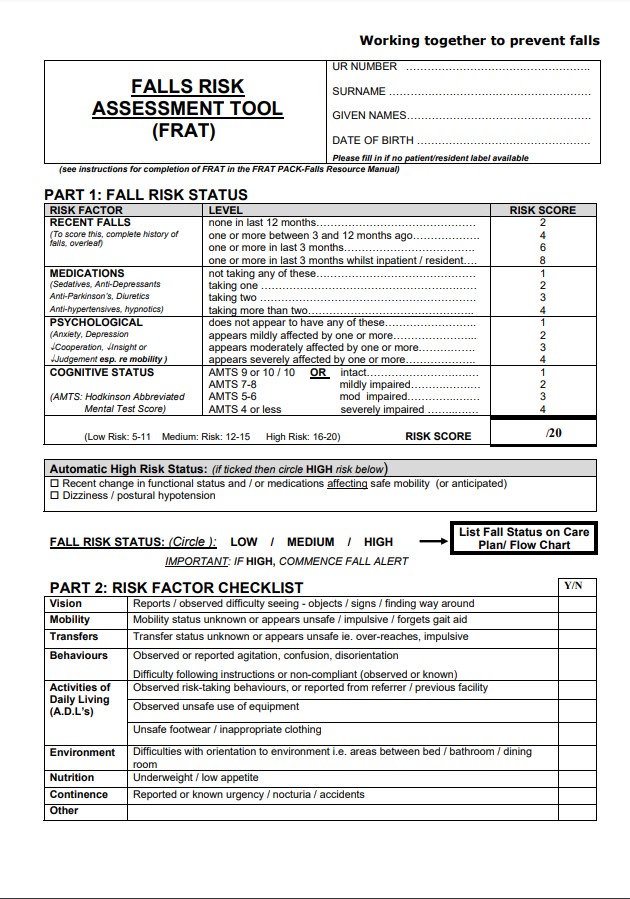How Dementia Fall Risk can Save You Time, Stress, and Money.
How Dementia Fall Risk can Save You Time, Stress, and Money.
Blog Article
The Ultimate Guide To Dementia Fall Risk
Table of ContentsThe Single Strategy To Use For Dementia Fall RiskRumored Buzz on Dementia Fall RiskNot known Incorrect Statements About Dementia Fall Risk Indicators on Dementia Fall Risk You Should Know5 Simple Techniques For Dementia Fall Risk
Evaluating autumn risk helps the entire healthcare team develop a more secure atmosphere for each person. Guarantee that there is an assigned area in your medical charting system where staff can document/reference ratings and document appropriate notes associated with fall prevention. The Johns Hopkins Loss Threat Evaluation Tool is among lots of tools your staff can make use of to assist avoid unfavorable medical events.Individual falls in medical facilities are common and devastating negative events that linger in spite of years of effort to decrease them. Improving communication across the assessing registered nurse, care group, patient, and individual's most included loved ones might enhance loss prevention initiatives. A team at Brigham and Female's Medical facility in Boston, Massachusetts, looked for to develop a standard fall prevention program that centered around boosted communication and individual and family members interaction.

The innovation group emphasized that successful execution depends on person and staff buy-in, combination of the program into existing operations, and fidelity to program procedures. The group noted that they are grappling with exactly how to guarantee connection in program implementation during durations of situation. Throughout the COVID-19 pandemic, for instance, a rise in inpatient drops was related to restrictions in person engagement along with limitations on visitation.
A Biased View of Dementia Fall Risk
These cases are generally taken into consideration avoidable. To carry out the intervention, companies require the following: Access to Fall TIPS resources Loss ideas training and re-training for nursing and non-nursing staff, including new nurses Nursing operations that permit for individual and family engagement to conduct the falls analysis, make certain usage of the avoidance plan, and conduct patient-level audits.
The results can be very destructive, often increasing person decrease and triggering longer hospital keeps. One research estimated stays increased an additional 12 in-patient days after a client loss. The Loss TIPS Program is based on engaging patients and their family/loved ones across 3 primary processes: analysis, personalized preventative interventions, and auditing to guarantee that patients are participated in the three-step autumn prevention procedure.
The client analysis is based upon the Morse Autumn Scale, which is a confirmed fall threat evaluation device for in-patient medical facility settings. The range includes the 6 most common factors patients in hospitals drop: the individual fall history, risky conditions (consisting of polypharmacy), use IVs and other outside devices, psychological status, gait, and mobility.
Each danger factor relate to several actionable evidence-based interventions. The registered nurse creates a strategy that incorporates the treatments and shows up to the treatment team, individual, and family members on a laminated poster or printed aesthetic help. Nurses develop the plan while check consulting with the client and the person's family.
Dementia Fall Risk for Beginners
The poster functions as an interaction tool with various other participants of the individual's treatment team. Dementia Fall Risk. The audit component of the program includes evaluating the client's understanding of their risk elements and prevention plan at the device and medical facility degrees. Nurse champions conduct at the very least 5 private interviews a month with clients and their families to look for understanding of the loss avoidance plan

A projected 30% of these falls lead to injuries, which can vary in intensity. Unlike other unfavorable events that call for a standard scientific reaction, fall avoidance depends very on the requirements of the individual. Including the input of people that understand the client best permits for better personalization. This approach has actually shown to be more reliable than autumn prevention programs that are based primarily on the production of a risk score and/or are not personalized.
The Only Guide to Dementia Fall Risk

Based on bookkeeping outcomes, one site had 86% compliance and 2 sites had over 95% conformity. A cost-benefit analysis of the Autumn pointers program in eight hospitals estimated that the program price $0.88 per client to implement and resulted in financial savings of $8,500 per 1000 patient-days in direct expenses connected to the website link prevention of 567 tips over 3 years and eight months.
According to the advancement group, organizations thinking about carrying out the program must perform a readiness assessment and falls avoidance voids evaluation. 8 Additionally, organizations ought to make certain the necessary infrastructure and workflows for application and establish an execution strategy. If one exists, the company's Fall Avoidance Job Pressure need to be associated with preparation.
The Ultimate Guide To Dementia Fall Risk
To start, companies need to guarantee completion of training modules by nurses and nursing assistants - Dementia Fall Risk. Healthcare facility team should analyze, based upon the requirements of a healthcare facility, whether to anonymous use an electronic health and wellness document hard copy or paper variation of the autumn prevention plan. Implementing groups must recruit and educate registered nurse champions and develop procedures for auditing and coverage on autumn information
Personnel require to be included in the process of upgrading the process to engage patients and family in the assessment and avoidance plan procedure. Systems needs to be in location to ensure that units can recognize why an autumn occurred and remediate the cause. More particularly, nurses must have networks to supply ongoing responses to both staff and system leadership so they can change and boost autumn avoidance workflows and interact systemic problems.
Report this page